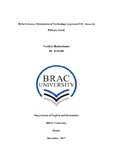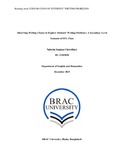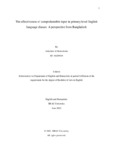| dc.contributor.advisor | Sanjana, Lubaba | |
| dc.contributor.author | Bhattacharjee, Vashkar | |
| dc.date.accessioned | 2018-03-11T03:56:20Z | |
| dc.date.available | 2018-03-11T03:56:20Z | |
| dc.date.copyright | 2017 | |
| dc.date.issued | 2017-12 | |
| dc.identifier.other | ID 16163001 | |
| dc.identifier.uri | http://hdl.handle.net/10361/9600 | |
| dc.description | This thesis is submitted in partial fulfillment of the requirements for the degree of Master of Arts in English, 2017. | en_US |
| dc.description | Cataloged from PDF version of thesis. | |
| dc.description | Includes bibliographical references (pages 72-78). | |
| dc.description.abstract | In the modern time, technology is taking over all sectors. The life of human beings are too
much dependent on modern technology that thinking of doing something without the help of
technology is impossible to think. This paper attempts to find out the assistance of technology
in present educational sectors, especially for young learners. To show how blended process of
using technology in the classroom can be incorporated in teaching learning process as the most
outcome-oriented and effective is the sole purpose of this paper. Regarding this issue, a survey
has been done by selecting 100 students of high beginners proficiency level and 20 teachers
from four different schools. The findings from the survey were analyzed using the mixed
method comprising both quantitative and qualitative research. All the data from the survey
conveyed that use of technology is really the most effective tool for getting a proper outcome
with successful language learning. Most of the teachers and students had agreed with all the
statements that were in favour of using technology. Rather following a single method, blended
or Hybrid classroom has the potential to make students more motivated towards their learning.
This study is important for all educationalist along with students to get the proper idea of the
effectiveness of Hybrid classrooms in lower intermediate student level. Besides this paper also
suggested some recommendations for the teacher to acknowledge own-self with the language
of modern technology. Few drawbacks are found during conducting the survey, which are
discussed in the tangible points. | en_US |
| dc.description.statementofresponsibility | Vashkar Bhattacharjee | |
| dc.format.extent | 83 pages | |
| dc.language.iso | en | en_US |
| dc.publisher | BRAC University | en_US |
| dc.rights | BRAC University thesis are protected by copyright. They may be viewed from this source for any purpose, but reproduction or distribution in any format is prohibited without written permission. | |
| dc.subject | Technology | en_US |
| dc.subject | Traditional class | en_US |
| dc.subject | Hybrid class | en_US |
| dc.subject | ESL class | en_US |
| dc.subject | Primary level. | en_US |
| dc.title | Hybrid classes: orientation of technology in present ESL classes in primary level. | en_US |
| dc.type | Thesis | en_US |
| dc.contributor.department | Department of English and Humanities, BRAC University | |
| dc.description.degree | M.A. in English | |




